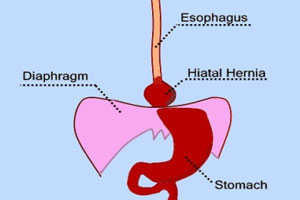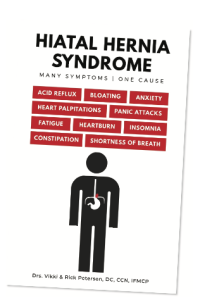Misdiagnosed Hiatal Hernia : Why is the Condition so Often Missed? – Video
Misdiagnosed hiatal hernia: why is it such a common occurrence?
What you will learn about
Summary
In this video, Dr. Vikki Petersen explains the reasons behind a very common situation: patients left with a misdiagnosed hiatal hernia. Traditional medicine tends to isolate the symptoms instead of looking at them as a syndrome, i.e. a group of symptoms which consistently occur together, or a condition characterized by a set of associated symptoms.
A patient may have heart palpitations among other symptoms, but an EKG will not reveal any abnormal heart condition. Another patient may have anxiety attacks, and their doctor will tell them that “it’s all in their head” and putting them on dangerous meds… thereby resolving nothing.
Dr. Vikki Petersen covers some of the symptoms that, if examined together, would reduce the frequency of misdiagnosed hiatal hernias.
Transcript
Your set of symptoms may completely be ignored and leave your hiatal hernia misdiagnosed. So let’s first go through some of the common symptoms.
Symptoms of Hiatal Hernia Syndrome

You are constipated. You don’t move your bowels one to two times a day effortlessly.
You might have shortness of breath. You just get breathless during the day even when you’re not doing a lot of activity, and maybe you were used to be able to do a lot of activity. Now you’re getting breathless, just walking around the house…
You have heart palpitations, you have anxiety…
Now, understand you don’t necessarily have to have all of these symptoms, but this is a syndrome, where one root cause is causing this whole host of symptoms.
You feel worse at night, you can wake up with heartburn or panic attack or heart palpitations in the middle of the night.
So you’re not sleeping well, this feeling of anxiety can come upon you at night.
It can also come upon you during the day.
Digestively, you are uncomfortable, you’re eating less and less. You’re eating less and less foods, and you’re just miserable.
So why is it that misdiagnosed hiatal hernia is such a common occurrence?
Misdiagnosed hiatal hernia: doctors all too often miss it…

But what else are they finding? Maybe they’re finding a little inflammation in the esophagus, but they’re saying it’s mild.
Or maybe you’ve had an endoscopy, a colonoscopy, and they say “You’re completely fine“, but you’re miserable with all these symptoms.
Maybe you’ve heard of hiatal hernia because it’s now getting more… not popular, but more common such that people are hearing about it more.
And you’ve gone through the endoscopy as I mentioned, and they said “No, that’s not it“.
It could be a full-blown syndrome, and your physician will still leave you with a misdiagnosed hiatal hernia.
Let me explain why that is.
…because it’s not always obvious
A frank hiatal hernia is when your stomach comes up above your diaphragm. And there is such a thing as a sliding hiatal hernia, where it goes down and comes up. So it’s up and down.
Now that can be missed upon testing because it happened to be down when they do the test, versus up.
But there’s also what we have deemed a “subclinical hiatal hernia“, meaning that there’s your diaphragm and your stomach and spasm pushed up against your diaphragm. It is still creating that discomfort as far as eating, that breathlessness, shortness of breath feeling, the heart palpitations, the anxiety…

It doesn’t have to be a frank hiatal hernia, but just enough that it’s pushing up on it — that diaphragm is now in spasm.
And instead of freely moving, so you can get all the oxygen that you need, it’s more like [sounds] because it’s in spasm.
So you will have that whole cascade of symptoms and you’ll be tired along with everything else I just mentioned.
And you left with a misdiagnosed hiatal hernia and told that “It’s in your head, you’re under stress, here’s what we need to do: here’s your antidepressant, and here’s your anti-anxiety medication“.
These [meds] are very dangerous. They’ve recently absolutely been proven not to work. That’s a dangerous way to go about it.
Misdiagnosed Hiatal Hernia Syndrome: it’s not in your head
I just want you to know that this is not in your head. I talk to patients from all over the world — mostly here in the U.S., but also from all over the world — who are just so miserable, losing their quality of life because they’re being told they’re just emotionally unstable and they’re “making this up because your heart is fine, your lungs are fine, we can’t find a hiatal hernia, you don’t have cancer“.

So if this is you, if you know of anybody who has these type of symptoms… It’s very hard to explain… I can just tell you… I run into that all the time too, with patients. They’re like: “You know, my spouse just doesn’t get it. My family just doesn’t get it“. And they don’t, if you never experience this, it’s like: “Why are you feeling anxious? Look around, honey, everything’s fine.” You go: “I get it. I’m still anxious“.
Why? Because you can’t turn off those stress hormones that are being created by your body because your diaphragm is not getting enough oxygen. Okay? You can’t just go “Oh, not now!” and turn it off and be happy again.
It’s not the way it works. This is out of your control.
Mild-to-moderate hiatal hernia: surgery unnecessary
We can get you back in control by getting to the root cause of this problem, and it’s not difficult.
It does not require surgery [in mild-to-moderate cases]. It typically requires no medication. There is a natural program for it.
And believe me, if you are not suffering with this, you likely know someone who is, because it’s that common.
Why Root Cause Medical Clinic?
The medical approach used at Root Cause Medical Clinic seeks to uncover the underlying root cause creating your body’s ill health or malfunction. From there, we develop a personal program to end the discomfort and inconvenience of poor health.

The fact is these stressors are inhibiting your body’s ability to heal itself.
If you have a misdiagnosed hiatal hernia syndrome, there is a root cause for it. Let’s not ignore it; let’s find it.
Our team of clinicians all share the same philosophy on health. They combine their experience in functional medicine, nutrition and dietetics, physical therapy and chiropractic to help you heal faster.
Root Cause Medical Clinic is located in Clearwater, FL, at the corner of Ft Harrison Ave. and Magnolia.
We also offer telehealth medicine services if coming to our clinic is not convenient. If you live in another state, please call us to see if we can serve you.
Other information references
Misdiagnosed hiatal hernia syndrome: a common occurrence
Research study on the Clinical Significance of Hiatal Hernia


